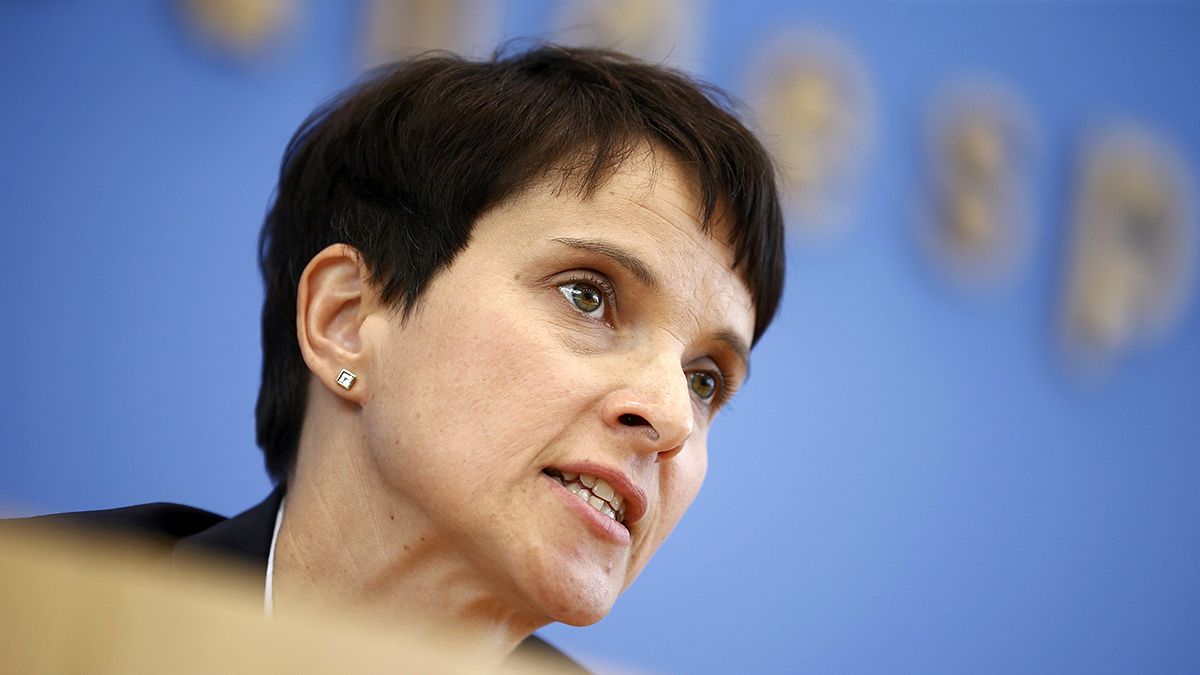A new poll suggests Germany’s anti-immigrant Alternative for Germany party – or AfD – is winning more support than ever before.
A new poll suggests Germany’s anti-immigrant Alternative for Germany party – or AfD – is winning more support than ever before.
It predicts the party would net 16 percent of the vote if a federal election was held now.
The AfD made huge gains in recent regional elections, getting seats in 10 of 16 state assemblies.
It’s benefited from a backlash over Chancellor Angela Merkel’s refugee policy, and the arrival of a million migrants last year.
Euronews met AfD party leader, Frauke Petry, in Berlin.
Valerie Zabriskie, euronews: “Part of the reason for your growing popularity is that you are not afraid to say certain things that people think or other politicians won’t say. But isn’t there a certain danger sometimes maybe saying things that others won’t?”
Frauke Petry, AfD leader: “If we still believe in solutions that are result from an open discussion, then we should believe in the fact that discussions can help solve problems and not covering up problems.
“And we Germans are quite good in covering problems, seeking the consensus, seeking the agreement before we even have elaborated on the problem.
“And I think this is why many citizens don’t believe in the established parties and politicians anymore, because they simply don’t feel being taken seriously by the politicians firstly, and secondly because they feel basically betrayed by these politicians because they do not tell the truth.”
Valerie Zabriskie, euronews: “Regarding Europe your party started with reaction towards the eurozone crisis and the bailouts. But are you anti-European Union?”
Frauke Petry, AfD leader: “We think what we had in the 60’s, 70’s even in the first of the eighties, made Europe a lot stronger than what we are now. And the Euro project was the project of the attempted European Constitution showed that the vast majority of European countries is not willing to give up their sovereignty, which I think is perfectly alright.
“This is a sovereign situation and I don’t think that we are going to help Europe to stay strong in a worldwide competition if we try to equalise everything, like it was done in socialism.
“The socialist project in East Europe failed so apparently at the end of the eighties. Now we try to copy the same thing into Europe. It’s not going to work.”
Valerie Zabriskie, euronews: “Now I have to bounce back and talk about for example North-Africans and their religion and the way they treat women, but isn’t there the fear that you will create a scapegoat?”
Frauke Petry, AfD leader: “The Islam, the foundations of this religion are not compatible with democracies. And that is nothing only the AfD says, now that we started the discussion you find lots of politicians admitting exactly that, but they have been ignoring the problem for years.
“So I think our duty in Germany is to make the problem become apparent in order to find a solution. We agree very much with modern Muslims who like to live in Germany, who feel as Germans, and want to stay here.
“Most of them adapted to our traditions, but those of them who don’t want to do that, they should go back and live whatever they want to live but not in Europe, not in Germany. That’s what we say.”
You can get more analysis of the populist rise in Germany, and in Austria, in a special Insiders programme, on euronews and at euronews.com
